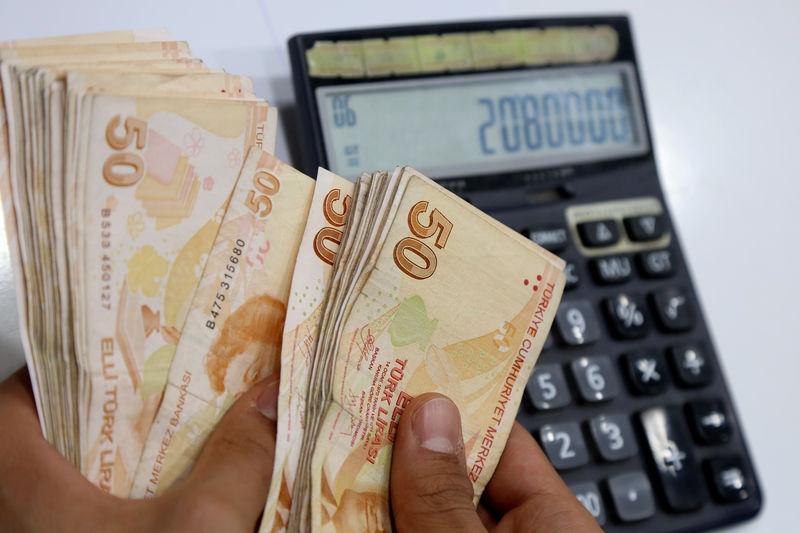By Behiye Selin Taner and Karin Strohecker
ISTANBUL (Reuters) - Turkey's lira weakened more than 2 percent on Thursday, giving up some of the hefty gains it made after the central bank raised interest rates by 300 basis points on Wednesday in an emergency move to prop up the tumbling currency.
The central bank raised its top interest rate to 16.5 percent from 13.5 percent at an extraordinary meeting prompted by the lira's relentless fall in recent weeks. It had depreciated as much as 23 percent so far this year before the bank's move.
Investors have hammered the currency on concerns about the central bank's ability to tame double-digit inflation, particularly after President Tayyip Erdogan -- a self-described "enemy of interest rates" -- said he expected to assert more policy control after June 24 elections.
After the initial bounce following the bank's move -- the currency swung from a 5 percent loss to a more than 2 percent gain -- investors now appear to be concerned whether the rate increase was enough to put the currency on a steady footing.
"It might prove insufficient to stabilize the currency, as concerns about monetary policy-making in the post-election period will remain ... given the President's vow to tighten his grip on economy policy," said Gokce Celik, chief economist at QNB Finansbank, in a note to clients.
The lira
The yield on Turkish 10-year government bonds (TR10YT=RR) fell to its lowest since May 15. Dollar bonds rose, and the cost of insuring Turkish debt against default fell to a one-week low.
FURTHER TIGHTENING
Some analysts pointed out that the bank, in Wednesday's statement, dropped its usual wording that "further monetary policy tightening will be delivered, if needed". That sowed some concern that it may not increase rates at its next scheduled policy meeting, on June 7.
"We will need to see some further tightening in the regular scheduled (monetary policy committee) meeting on June 7 as well," said Inan Demir, of Nomura International. "So that they can increase the real rate and go beyond catching up with inflation and actually move ahead of the curve."
Following the bank's move, Erdogan said "financial discipline will continue and the necessary things will be done for financial stability".
But he also said the currency's volatility did not reflect economic reality and, echoing his frequent references to foreign threats, warned that he would not let "global governance types" ruin the country.
Erdogan, an economic populist, wants to see lower borrowing rates to fuel credit growth and new construction. Investors, who fear the economy has overheated after a more than 7 percent expansion last year, want decisive rate hikes to cool inflation.
The president also said in his speech on Wednesday he would look to take action on inflation after the June 24 vote -- although he did not say concretely what that might be.

"We will definitely take measures to lower the inflation and current account deficit in a very different way after the elections," Erdogan said.